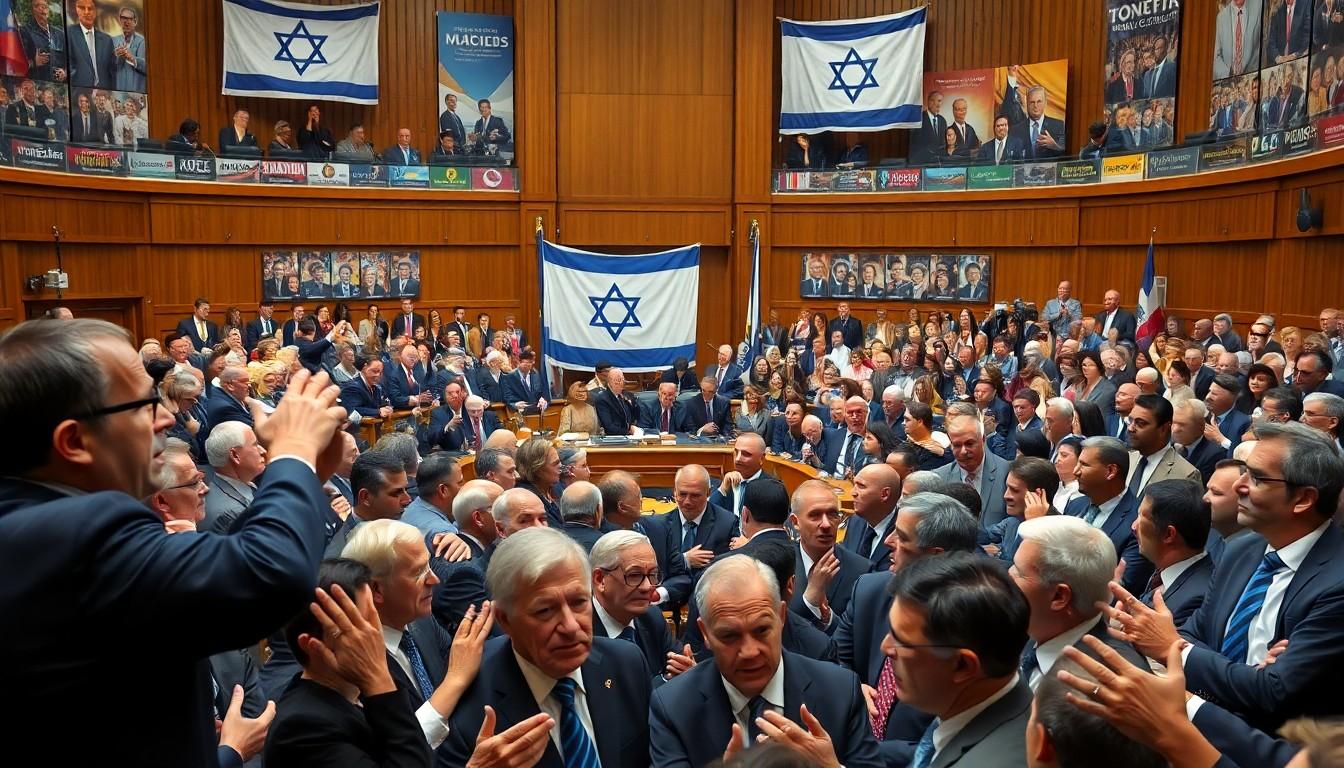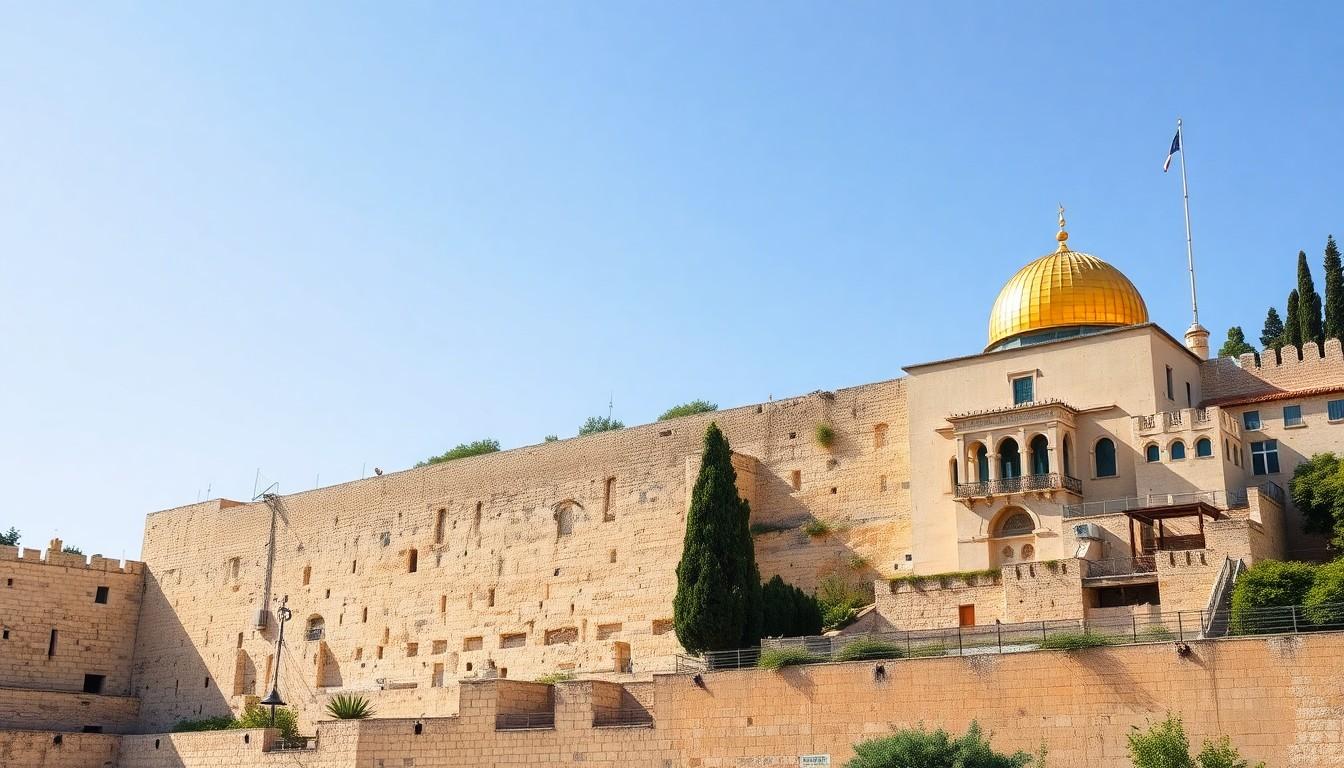Physical Address
304 North Cardinal St.
Dorchester Center, MA 02124

Israel’s political landscape is a captivating mix of drama, intrigue, and a sprinkle of chaos that could rival any soap opera. With a history steeped in conflict and a vibrant democracy, it’s a place where every election feels like a cliffhanger. From coalition governments that seem to change faster than a chameleon to debates that could make even the most seasoned politicians sweat, Israel’s politics keeps everyone on their toes.
Understanding the nuances of Israeli politics isn’t just for political junkies; it’s essential for anyone interested in global affairs. With shifting alliances and policies that impact not just the region but the world, diving into this topic reveals a fascinating interplay of culture, history, and power. Buckle up as we explore the quirky yet serious world of Israel’s political scene, where every twist and turn could lead to a new chapter in its storied saga.
Israel’s political environment is characterized by multi-party systems and complex coalitions. Various political parties span the spectrum from left to right, reflecting diverse ideologies. Issues such as security, economy, and social policies frequently dominate political discourse. Citizens participate actively in elections, shaping government structure and policies.
Elections often result in no single party gaining a clear majority, leading to coalition governments. These coalitions face challenges, including diverse agendas and differing priorities among member parties. Consequently, stability remains elusive as alliances shift based on current events and public sentiment.
The Prime Minister plays a pivotal role in Israel’s politics. This individual oversees governmental operations and represents Israel internationally. Substantial authority resides with this leader, influencing key policies and decisions.
Significant events impact the political landscape, including regional conflicts and peace negotiations. Recent historical moments demonstrate how tensions can shift public opinion and alter party dynamics.
Public protests and social movements frequently arise, reflecting citizens’ desires for change. Demonstrations against government policies have led to increased political engagement among younger generations.
Understanding Israeli politics is essential for grasping the country’s influence in global affairs. Every political development carries potential consequences, not only for Israel but for the Middle East and beyond. This dynamic landscape continuously evolves, requiring close attention to shifts in policy and leadership. As such, grasping the intricacies of Israel’s political system becomes crucial for informed discussions on international stability and peace.

Israel’s political landscape is deeply rooted in its complex history, shaped by various socio-political factors and critical events.
The early political landscape emerged post-World War II, marked by the establishment of political groups. Various factions, such as the labor movement and right-wing parties, shaped ideological divisions. Conflicts over land and governance significantly influenced party dynamics. The Declaration of the State of Israel in 1948 set the stage for a parliamentary democracy. Diverse opinions led to a multi-party system, allowing different perspectives to influence political discourse. This foundational period laid the groundwork for current coalition politics.
Key historical events have defined Israel’s current political framework. The 1967 Six-Day War transformed territorial boundaries and demographics, intensifying national security debates. The signing of the Oslo Accords in the 1990s pushed peace discussions with Palestine into the spotlight. Increased tensions during the Second Intifada in the early 2000s altered public sentiment and political alliances. More recently, shifting regional dynamics, including relationships with neighboring states, added complexity to the political climate. Each event intricately weaves into the narrative of Israel’s ascent as a democratic state amidst ongoing challenges.
Israel’s political landscape features a vibrant and complex architecture shaped by a range of parties and an intricate electoral system.
Several significant political parties dominate the Israeli political scene. Likud, a right-wing party, emphasizes security and nationalism. The Labor Party, historically associated with socialism, focuses on social justice and peace initiatives. Blue and White emerged as a centrist alternative aimed at bridging divides within society. Other notable parties include the Joint List, representing Arab citizens, and Yamina, which aligns with right-wing nationalist policies. Each party offers distinct platforms, influencing coalition compositions inside the Knesset.
Israel’s electoral system uses a proportional representation model. Each voter casts a ballot for a party rather than individual candidates. Parties receive seats in the Knesset based on their percentage of the national vote. The threshold for representation stands at 3.25%, enabling smaller parties to gain representation. Frequent elections often occur due to challenges in forming stable coalitions, which complicates governance. Turnout rates typically hover around 70%, indicating robust public engagement in the democratic process.
Israel’s political landscape revolves around pressing issues that significantly influence its governance and public discourse.
Security remains a top priority for Israel. Ongoing regional conflicts and threats from neighboring entities drive defense policies and military strategies. The country allocates a significant portion of its budget to defense, reflecting the security challenges it faces, including conflicts with Hamas in Gaza and tensions with Hezbollah in Lebanon. Citizens regularly express concerns about safety, particularly during escalations in violence. The Prime Minister’s administration frequently navigates complex negotiations and intelligence operations, aiming to strengthen national security. Previous wars, such as the 2014 Gaza conflict, continue to shape public perceptions and policy decisions. Citizen engagement in debates over defense strategies indicates the significance of these issues in everyday life.
Economic challenges pose critical questions for Israeli society. Rising living costs, housing shortages, and income inequality spark public protests and discussions about reform. The nation’s reliance on the technology sector drives economic growth, yet it also leads to disparities between urban and rural areas. Younger generations seek affordable housing and job opportunities, compounding social tensions. Global events, such as economic fluctuations and trade agreements, also influence domestic economic policies. Previous measures, like austerity programs and stimulus packages, reflect attempts to address these challenges. Public sentiment towards economic policies further complicates coalition formation, as parties navigate varying interests to create an effective governance strategy.
Israel’s international relations are characterized by a complex web of alliances and conflicts that impact its position in the global arena.
Israel’s relationships with neighboring countries have fluctuated over the decades. Peace treaties with Egypt and Jordan marked significant milestones, establishing diplomatic relations since 1979 and 1994, respectively. Nevertheless, tensions persist with nations like Syria and Lebanon, primarily due to territorial disputes and security threats. The ongoing conflict with the Palestinian territories also complicates these relationships, affecting regional stability and dialogue. Additionally, recent normalization agreements with Arab nations, such as the United Arab Emirates and Bahrain, demonstrate a shift towards broader cooperation in trade, technology, and security. These developments show Israel’s efforts to enhance regional partnerships while navigating longstanding hostilities.
Global powers play a crucial role in shaping Israel’s foreign policy. The United States remains Israel’s closest ally, providing substantial military aid and political support. This partnership influences Israel’s strategic decisions and security measures, especially concerning Iranian aggression and regional threats. The European Union also engages in Israeli affairs through diplomatic channels and economic ties, although it often critiques Israeli policies regarding settlements and human rights. Furthermore, Russia’s increasing presence in the Middle East complicates relations further, as it maintains ties with both Israel and adversarial states. These dynamics illustrate how international influences shape Israel’s approach to diplomacy and security in a rapidly evolving geopolitical landscape.
The complexities of Israel’s political landscape reveal a nation in constant flux. With its diverse party system and ever-shifting coalitions, understanding these dynamics is vital for anyone interested in global politics. The interplay between domestic issues and international relations shapes not only Israel’s future but also impacts the broader Middle East.
As citizens engage more actively in the political process, the potential for change remains high. The ongoing challenges of security, economy, and social policies continue to dominate discussions, making it essential for observers to stay informed. The narrative of Israeli politics is far from static; it’s a story that unfolds with each election and policy shift, reflecting the aspirations and concerns of its people.